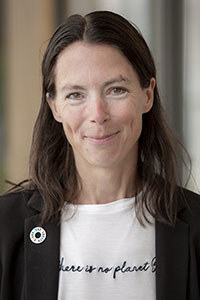Sustainable clothing futures
Start date: 2021-12-01
End date: 2024-11-30
The clothing sector of today has great sustainability challenges, including high primary resource use, extensive climate (and other) emissions, linear supply- and use patterns and low use rates of garments. A shift towards sustainable and circular clothing is a complex journey that needs to consider the entire value chain and its societal context.
The sustainable clothing futures project adopts a holistic approach, aiming to map consumer behavior connected to new business models, evaluate new production and recycling technologies and investigate which policy measures could support the transition to sustainability.
An interdisciplinary team comprising researchers from University of Borås, including the Swedish School of Textiles and Science Park Borås, IVL Swedish Environmental Research Institute and the environmental consultant company Profu, will combine field studies in consumption behavior with system dynamic scenario building, Life Cycle Assessment and policy analysis. This combination of methods provides parallel insights into the rational and key factors driving change in the clothing sector, as well as quantitative assessments of the changes in terms of environmental impacts. Input will be drawn from diverse stakeholder groups such as consumers, representatives from the clothing and recycling industry, and policy makers to create scenarios for the clothing sector of tomorrow. Results will help to identify the most promising technologies and practices, and under which circumstances they could become a reality. The upscaling through scenarios also reveals the potential for new skills and jobs that could be created in the European clothing sector of tomorrow.
Project goals
- Map of clothing use in different customer segments (WP1).
- Evaluate new business models for clothing use in terms of resource use and climate impact, including effects of e-trade and logistics (WP1).
- Estimate potentials for new production, sorting and recycling technologies to change existing supply patterns, and reduce primary resource use and climate impact (WP2).
- Evaluate which different types of policy measures could support more sustainable use of clothing through the value chain (WP3).
Work Package 1 (WP1)
The objective of WP1 is to investigate how and under what condition new fashion business models successfully reconfigure the everyday practices of consumers and what consequences this has for sustainability.
The first part consists of a consumer field study, designed to explore how and under what condition consumers everyday fashion practices can be reconfigured to engage them in renting, reselling or repairing schemes.
30-60 households – younger consumers, families with children, and empty nesters – will be recruited to subscribe to a fashion change initiative in one of the three areas - renting, reselling, repairing - during a period 6-9 months.
The expectation is that the variation regarding the contextual situations of the households and the various change initiatives will produce interesting result allowing us to understand what initiatives fit with which life situations and, in combination with the LCA-analysis, where the most favourable sustainability effects can be achieved.
Contact
Niklas Sörum or Rudrajeet Pal (for questions regarding WP1, the University of Borås part of the project)
Maja Dahlbom, Project Leader at IVL
External researchers
Emma Samsioe, Christian Fuentes and Réka Ines Tölg, Lund University.






